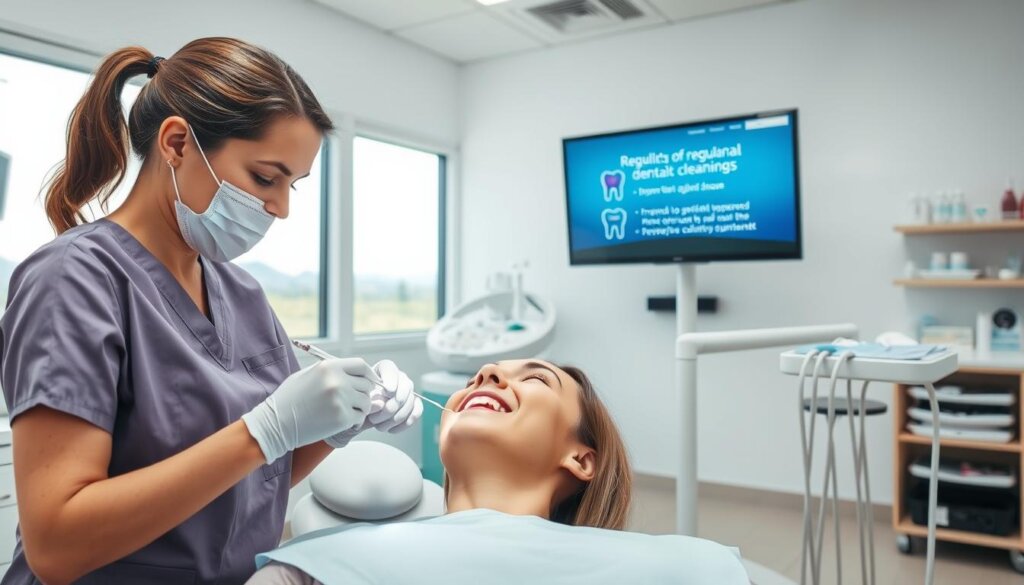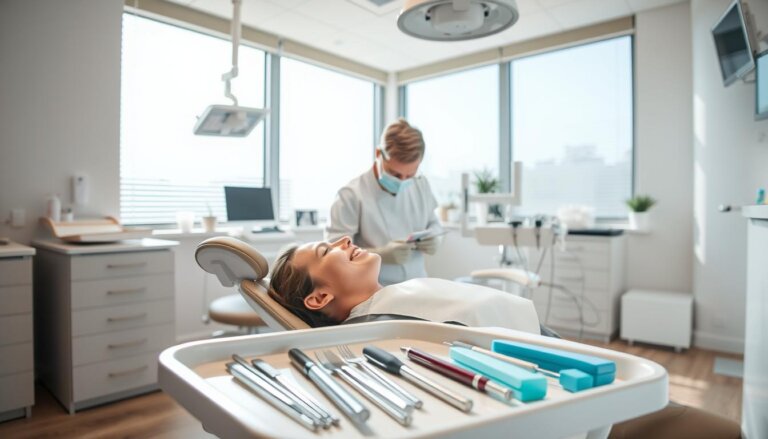Are Regular Dental Cleanings Really Necessary?
Over 47 percent of American adults have gum disease. This shows how fast tartar can build up. It makes us wonder: Are regular dental cleanings really necessary?
Brushing and flossing at home can miss hidden plaque. Dental cleanings are key because they remove tough buildup. They also catch early signs of tooth decay. This helps keep teeth strong and gums healthy.
Key Takeaways
- Cleanings remove plaque and tartar left behind by daily brushing.
- Dental professionals spot early gum issues before they worsen.
- Consistent care lowers the risk of cavities and systemic problems.
- Professional attention maintains oral health and freshens breath.
- Routine evaluations support long-term dental well-being.
Understanding the Purpose of Dental Cleanings
Dental cleanings are key to good oral health. Places like Cleveland Clinic focus on removing plaque and bacteria. This helps prevent gingivitis.
They use scaling and polishing to stop harmful growth early. This makes it easier to care for your teeth at home and boosts your overall health.
What Happens During a Dental Cleaning?
A dental hygienist carefully removes tartar that brushing can’t get. Then, they polish your teeth to prevent future buildup. Flossing comes last, reaching tight spots between your teeth.
Each step is important for keeping your enamel strong. It also helps prevent problems.
Benefits of Professional Teeth Cleaning
Regular cleanings catch issues early, saving you money and time. They also make your teeth shine, boosting your confidence. These sessions are key to keeping your gums healthy.
| Cleaning Stage | Result |
|---|---|
| Scaling | Eliminates plaque, discouraging bacterial buildup |
| Polishing | Creates a smoother surface, reducing future deposits |
| Flossing | Prevents debris retention in narrow gaps |
Importance of Preventive Care in Dentistry
Daily brushing and flossing are key to healthy teeth. But, professional visits take it up a notch. Dentists stress the need for dental cleanings to fight plaque and keep enamel strong.
These sessions get rid of tough tartar and stains. Patients see fewer problems with regular visits. This leads to better oral health over time.

Regular checkups are at the heart of good dentistry. Home care can miss plaque, leading to gum disease. Studies show that regular visits prevent cavities and gum disease.
How Cleanings Prevent Oral Health Issues
Cleanings stop bacteria from harming gums and bones. Those who go for cleanings every six months or a year have stronger teeth. Removing tartar and polishing early can avoid big problems later.
- Eliminate harmful deposits before they cause decay
- Identify early signs of disease under a dentist’s supervision
- Boost daily care with professional tools and advice
The Role of Dental Hygienists
Dental hygienists work with dentists for detailed cleanings. They remove plaque, polish teeth, and teach patients. These experts help people of all ages keep their teeth healthy for years.
| Preventive Strategy | Primary Benefit |
|---|---|
| Routine Dental Visits | Early Detection of Decay |
| Frequent Cleanings | Reduced Risk of Gum Disease |
Frequency Recommendations for Dental Cleanings
Experts often recommend getting a dental cleaning every six months. This advice comes from well-known institutions. Dentists say these visits help remove plaque and manage health fully. It’s important to remember that dental checkup frequency can change based on personal needs or habits.
How Often Should You Get a Cleaning?
For most healthy adults, getting a cleaning every six months is good. The Cleveland Clinic agrees with this for people with little plaque and healthy gums. But, some might need to go more often. Visiting every three or four months can help with stubborn tartar or early gum problems.
Factors Influencing Cleaning Frequency
Smoking, eating too much sugar, and some health issues can make you need more visits. People at high risk or with dry mouth issues might need closer checks. Tailoring plans to each person helps find the right dental checkup frequency for good oral health.
| Category | Suggested Interval |
|---|---|
| Healthy Adults | Every 6 Months |
| High-Risk Individuals | Every 3–4 Months |
| Smokers or Chronic Conditions | Varies by Diagnosis |
Consequences of Skipping Dental Cleanings
Not getting regular dental cleanings can lead to plaque and tartar buildup. This weakens tooth enamel and harms gum health. It’s important to start good dental habits early to fight off hidden bacteria.
Increased Risk of Cavities and Gum Disease
Ignoring dental care lets bacteria grow, causing tooth decay. Small cavities can turn into big problems, weakening teeth. Gum disease starts with gingivitis and can get worse.
Potential Health Impact Beyond Oral Health
Ignoring mouth infections can harm your heart and blood sugar levels. Studies show gum disease can make other health issues worse. Regular dental visits and good habits help prevent these problems.
Cost-Benefit Analysis of Regular Cleanings
Some people worry about the cost of regular dental visits. But, looking closely, the benefits far outweigh the initial cost.
Assessing the Financial Investment
Getting regular cleanings is a smart choice, not a waste of money. Catching small problems early can prevent bigger, more painful issues. This saves you from expensive treatments like root canals.
Studies show that early detection of problems can stop chronic inflammation. A dental exam and cleaning every six months can find hidden issues before they get worse.
Long-Term Savings from Preventive Care
Investing in preventive dental care is good for your health and wallet. Each cleaning session helps avoid costly treatments and keeps your gums healthy. Here are some key benefits:
- Less chance of needing major restorative work
- Fewer trips to the dentist
- More comfort and happiness
Regular dental care is a smart investment. It keeps your smile strong and saves you from unexpected dental bills.
Differentiating Between Cleanings and Routine Check-ups
Experts say both cleanings and check-ups are key for good dental care. Cleanings remove plaque and tartar. Check-ups look at teeth, gums, and risks. This combo fights bacteria and finds problems early.
What to Expect During a Check-up
At a check-up, you get a full dental check. Dentists check teeth alignment, gum health, and for decay. They might take x-rays to find hidden cavities or bone changes.
X-rays help find issues that could get worse. They also check how old fillings are doing and watch for changes in teeth and jaw.
How Cleanings Complement Check-ups
Cleanings and check-ups work together to keep your mouth healthy. Cleanings remove plaque and tartar. Check-ups find problems early. Most dentists do both together to keep your teeth healthy for the long term.
| Procedure | Focus | Frequency | Advantages |
|---|---|---|---|
| Cleaning | Removing plaque and tartar | Twice yearly | Prevents gum disease and decay |
| Check-up | Detailed oral examination | Twice yearly | Identifies early dental concerns |
Unique Needs for Different Age Groups
Age affects how we care for our teeth. Young ones need methods that help their teeth grow. Older adults need special care to keep their teeth healthy for a long time. A good plan is key to preventing dental plaque for everyone.
Dental Care for Children and Adolescents
Young people often need more dental visits and treatments as their teeth change fast. Sealants can protect teeth from cavities. It’s important for them to brush and floss regularly. This helps their teeth stay healthy.
Senior Dental Care Considerations
Older adults might face gum problems and dry mouth. These issues can lead to plaque buildup. Regular dental visits and cleanings can catch problems early. Special cleanings and fluoride treatments help keep their teeth strong.
Impact of Lifestyle Choices on Dental Health
Daily oral routines protect our teeth, but some habits can harm them. Too much sugar and acidic drinks can wear away enamel. This makes teeth more prone to cavities. Also, harmful substances can damage gum health by reaching deeper tissues.
How Diet Affects Oral Hygiene
Eating too many refined carbs and citrus drinks weakens teeth. This allows bacteria to grow, increasing decay risk. Doctors recommend eating foods that strengthen enamel, like leafy greens and dairy.
Snacks and sports drinks with hidden sugars can harm gums. Drinking water instead can help prevent enamel damage.
Effect of Smoking and Alcohol on Teeth
Cigarette smoke stains teeth and irritates sensitive areas. Drinking strong alcohol can reduce saliva, drying out the mouth. This weakens the mouth’s natural defense.
- Smokers often see more gum recession and slower healing.
- Drinking alcohol often hides early signs of disease, leading to late detection.
These issues require more dental care. Regular check-ups help catch small changes early. This allows for personalized advice for better oral health.
Technology and Innovations in Dental Cleanings
New tools and methods are changing dental care. Patients enjoy more comfort, better plaque removal, and targeted tartar strategies. Many clinics offer sedation dentistry for those with anxiety, making procedures calmer.
Advances in Dental Cleaning Tools
Ultrasonic scalers use high-frequency waves to break down deposits gently. Air-polishing devices blast away stains with a powder and water stream. These tools make cleanings faster and less painful.
- Faster removal of hardened plaque
- Less friction against tooth surfaces
- More precision for targeted areas
Benefits of Digital X-rays and Imaging
Digital scans show tooth and gum conditions in real-time. They help spot decay or structural issues early. This can prevent more serious procedures later.
These scans use safer radiation and show high-resolution images. They help plan treatments better. This approach improves patient experiences and oral health outcomes.
Emotional and Psychological Benefits of Cleanings
Many people worry a lot about going to the dentist. But cleanings do more than just keep your teeth healthy. They can also help you feel less anxious and more positive. Cleveland Clinic offers sedation dentistry for those with severe anxiety, making visits calmer.
Overcoming Dental Anxiety
There are ways to reduce dental anxiety. Talking openly, creating a comfortable setting, and getting personal support helps. Sedation dentistry can make you feel relaxed, which helps you feel less nervous.
Mental tricks like visualization and deep breathing also help. Feeling in control during cleanings can make you more confident as you go through treatment.
Building a Trusting Patient-Dentist Relationship
Trust grows when dentists explain everything clearly and gently. They answer your questions with kindness. This turns dental visits from scary to important for your health.
A caring relationship between you and your dentist makes you feel safer. This encourages you to go for regular cleanings. It leads to healthier smiles and better emotional health.
Debunking Myths Around Dental Cleanings
Many think dental cleanings are painful and not needed if you brush regularly. But, the truth is different. Professional cleanings reach spots that brushing can’t, leading to better health in the long run.
Common Misconceptions Addressed
Some believe brushing alone stops all plaque buildup. Others think deep brushing means no need for professional cleanings. But, studies show that dental exams catch problems early, making care easier and more effective.
These visits help prevent gum disease with deep cleaning and advice. This makes a big difference in your health.
- Myth: Personal brushing alone eliminates the need for dental visits.
- Myth: All cleanings involve sharp tools and intense discomfort.
Clarifying Misunderstandings About Pain
People who brush and floss well often find cleanings barely uncomfortable. The American Dental Association backs this up. Healthy gums handle scaling and polishing well.
But, fears can hold you back. Talking to a dentist you trust can help. They use gentle methods to make the experience better.
Choosing the Right Dental Professional
Finding a qualified dentist is key to good oral health. A good dentist keeps up with new research and has respected credentials. They also value open communication, making visits comfortable and precise.
Factors to Consider When Selecting a Dentist
Look for dentists with board certifications and memberships in professional groups. Modern equipment shows they follow the latest dental practices. An office that offers many services, from cleanings to advanced imaging, is ready for any need.
Clear explanations of treatment plans build trust. This leads to better patient experiences.
Importance of Personal Recommendations
Friends or colleagues can give valuable insights into a dentist’s style. Hearing about positive experiences can ease worries. Trustworthy referrals boost confidence in the dentist’s skills, helping maintain good oral health over time.
Conclusion: The Case for Regular Dental Cleanings
Regular dental cleanings are key to keeping your teeth and gums healthy. Studies show that getting your teeth cleaned often can lower the risk of cavities and gum disease. These visits also help catch problems early, preventing them from getting worse.
Summary of Key Points
Getting your teeth cleaned deeply helps keep your mouth healthy and lowers the risk of infections. Good oral health is linked to overall well-being. If bacteria are not treated, they can spread beyond your mouth.
Regular cleanings mean you might avoid more serious treatments later on. This is a big plus for your health and wallet.
Final Thoughts on Oral Health Maintenance
Getting dental care on time can save you money and improve your life. By focusing on preventive care, you can keep your teeth strong and your gums healthy. This leads to more comfort and fewer problems as you age.
By sticking to regular check-ups and good home care, you can stay healthy at every stage of life. It’s a team effort that pays off in the long run.


